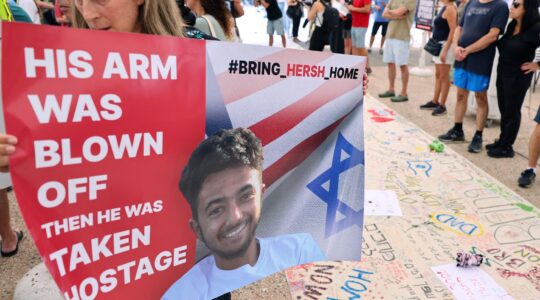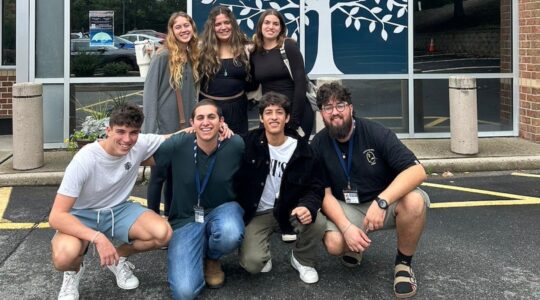JERUSALEM (JTA) — Pediatric oncologist Michael Weintraub of Hadassah Hospital recently found himself in the unenviable position of turning away ailing Palestinian children after the Palestinian Authority decided to halt payment for their treatment.
Originally citing anger over the war in Gaza and a desire to treat Palestinians in PA hospitals, the Palestinian Authority stopped funding treatment for the majority of Palestinians in Israeli hospitals as of Feb. 1, abruptly cutting off what in some cases is literally a lifeline.
“People could die in the next few weeks” if they do not receive proper treatment, said Weintraub, director of pediatric hematology, oncology and bone marrow transplantation at Hadassah. “Patients were denied coverage from one day to the next. If you stop cancer therapy for a month or two, the risk of relapse and death increases every day.”
The hospital stays were among the only humanitarian connections that had managed to survive the divisions of the Israeli-Palestinian conflict.
For many years, a significant number of Palestinians from the West Bank and Gaza have come to Israeli hospitals for medical care, often for sophisticated tests or life-saving treatments not available at Palestinian hospitals, such as bone marrow transplants or robotic surgery.
The decision to drastically reduce the number of Palestinians entering Israel for treatment came from the Palestinian Authority Health Ministry for reasons that appear to be both economic — the expense of medical treatment is considerable for the Palestinian Authority — and political.
But P.A. Health Minister Fathi Abu Moghli said that despite the financial strain of paying for health care in Israel and other countries like Jordan and Egypt, the decision to reduce the overall number of patients was made as part of a new plan to improve the Palestinian health care system.
“We continue referring abroad only patients in real need of medical services not available in Palestine,” he said in a comment by e-mail.
It was the Hamas regime in Gaza that first said it would not send its wounded to Israel for treatment in the wake of Israel’s operation in Gaza. That stance was then adopted by the Palestinian Authority, which is led by the more moderate Fatah faction, and was extended to include most Palestinians seeking care at Israeli hospitals.
Last year, about 28,000 Palestinians from the West Bank came to Israel for treatment and approximately 14,000 from Gaza, according to the Israel Defense Forces, which helps coordinate their travel permits. The patients received permission to come to Israel from Palestinian hospitals, which refer them to their Israeli counterparts.
Another apparent casualty of the new P.A. policy is the practice of sending Palestinian doctors to train at Israeli hospitals. Over the years, a strong professional network has developed between Palestinian and Israeli physicians because of the practice, helping ease the process of referrals. That could fall apart now.
Most of the Palestinians at Hadassah’s two hospital campuses in Jerusalem are from the West Bank. On average, the hospital saw 1,650 Palestinian patients per month. In recent weeks, since the P.A. directive was issued, that number has dwindled to less than 10.
At another major hospital where Palestinian cases are referred, Sheba Medical Center near Tel Aviv, there are no more new Palestinian patients, although about 50 patients have been at the hospital since before February, a spokesperson said. It was not clear how much longer they would be able to stay without funds to cover their care.
Nancy Falchuk, the national president of Hadassah, told JTA on a visit to Israel that she will be going back to the United States with the message that something must be done to help facilitate the Palestinians’ treatment.
While Hadassah is hesitant to become involved on a political level, Falchuk said she was speaking out “because medicine should be beyond politics.”
“For 97 years we have talked about people with heart disease and cancer, not Arabs and Jews, and that is what we want to continue doing,” she said of Hadassah’s long-standing approach to medical treatment here. “It’s an unfolding story. The hospital will do what it can to continue providing services.”
Palestinians pay the same state-subsidized rates as do Israeli patients. For additional help, Hadassah has philanthropic funds that help cover some extra costs at their facilities, and the Peres Center for Peace has a program that refers some 1,000 Palestinian children to Israel each year for either consultations or surgery. In cases of cancer, the center has split hospital fees with the Palestinian Authority.
Raphi Walden, deputy director of the Sheba Medical Center, said it’s perplexing to see the flow of patients disappear so quickly.
“It’s a very grave situation because people who are in the middle of receiving treatments that often do not exist in the West Bank and Gaza” will receive “a death sentence” if they lack treatment, he said.
Walden is also chairman of Physicians for Human Rights, which has protested the new P.A. policy and is trying to convince Palestinian and international human rights groups to join its call.
Every day, Weintraub said, he and his staff members field calls from Palestinian parents anxious about their children’s well-being. Among them are parents of children as young as 5 and 6 who are ill with leukemia. Many Palestinian patients and their relatives are wary of speaking to the media about the situation, hospital officials say, fearing it could make it difficult for them to eventually get back to the care they need.
Weintraub says he’s particularly concerned about a baby girl just under a year old who suffers from a hereditary immune deficiency. She underwent a complicated, cutting-edge bone marrow transplant at Hadassah at the age of 6 months. It saved her life.
The same procedure would have cost between $300,000 and $500,000 in the United States. In Israel, the fees were capped at $50,000.
After the Palestinian Authority ceased paying for her treatment this month, she was kept by the hospital free of charge for two weeks.
When it came time to discharge the girl, she was provided a supply of medication, but her parents, who were referred by the Palestinian Authority to a hospital in Nablus, have discovered there is no hospital in the West Bank that can adequately offer the follow-up care she needs, Weintraub said.
“This child’s life is in extreme danger at the moment,” he said.





